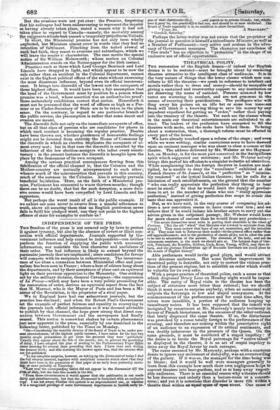INDEPENDENCE OF THE PRESS.
Tern 'freedom of the press is not secured only by laws to protect It against tyranny, but also by the absence of covert or illicit con- neiion with official departments. Journals .supported by Go- vernment influence and help cannot be independent—can neither perform the function of supplying the public with necessary information, nor maintain the true character and usefulness of their order. The bad influence i likely, to extend beyomithe particular journals tharare implicated; since candidates for favour will compete with its recipients in subserviency. The inconveni- ence of too close a connexion between Ministerial office and jour- nalism has been seen in France ; where a host of editors hang about the departments, and by their acceptance of place cast an equivocal light on their previous opposition to the Monarchy. One striking act by the military dictator, General Cavaignao—the suppression of La Presse--which may have been a very politic proceeding for the restoration of order, derives an equivocal aspect from the fact that M. Marrast, who is the Mayor of Paris and has been a Mi- nister of the Revolution, is the proprietor of a rival paper.
We in England have had our subservient journals, but the practice has declined; and when Sir Robert Peel's Government set the example of perfect fairness and equality in conveying to the journals such official information as it was deemed advisable to publish by that channel, the hope grew strong that direct con- nexion between Government and the newspapers had finally ceased. This notion is somewhat shaken by certain phtenomena just now apparent in the press, especially by one described in the following letter, published by the Times on Monday.
"Sir—Considering the monthly returns of the Board of Trade to be, under pre- heat circumstances,' of the highest public interest, I have taken for the last two months ample precautions to get them the ,Inoment they were published.' Usually they appear about the 8th of the month; but, to prevent the possibility of delay, I have adopted the plan of sending to the Parliamentary Paper *ca. every morning for several days preceding that date. I have thus sent during the present week; and this morning the answer again was, that the returns 14re not yet published. "To my complete surprise, however, on taking up the Economist of today I find the full returns inierted, together with analytical remarks which show that they must have been in the possession of that paper at an early hour yesterday morn- ing, or most probably on Thursday. "Last year the corresponding tables did not appear in the Economist till the 17th of July, but the date this month is the 8th. From these circumstances it would appear that the publication is not made fairly and simultaneously, but that the Economist is furnished with an exclusive copy. I am not aware whether this system is an unprecedented one or whether it is a recognized privilege of some Government departments to furirish early co-
pies of their domments cit. ,...aen papers or to private friends; hat, whieh- ever it pry 13e, the praetiect:.,-a bad one, and should be at once abolished. The Board of Trade especially is in no condition to show favouritism.
")'ours, &c. A ktzecnerr." " Cornhill, Saturday?'
Perhaps the letter-writer was not aware that the proprietor of the journal in question is himself a subordinate Minister, as well as a Member of Parliament—very active and zealous in the -advo- cacy of Government measures. The champion par excellence of "free trade" has no objection to "protection" in the shape of an exclusive use of official opportunities.


























 Previous page
Previous page